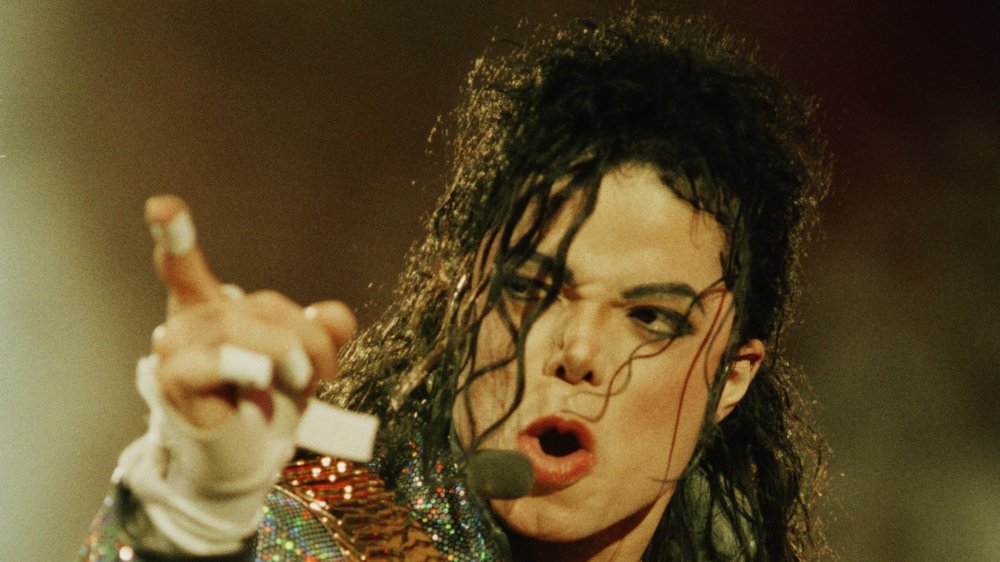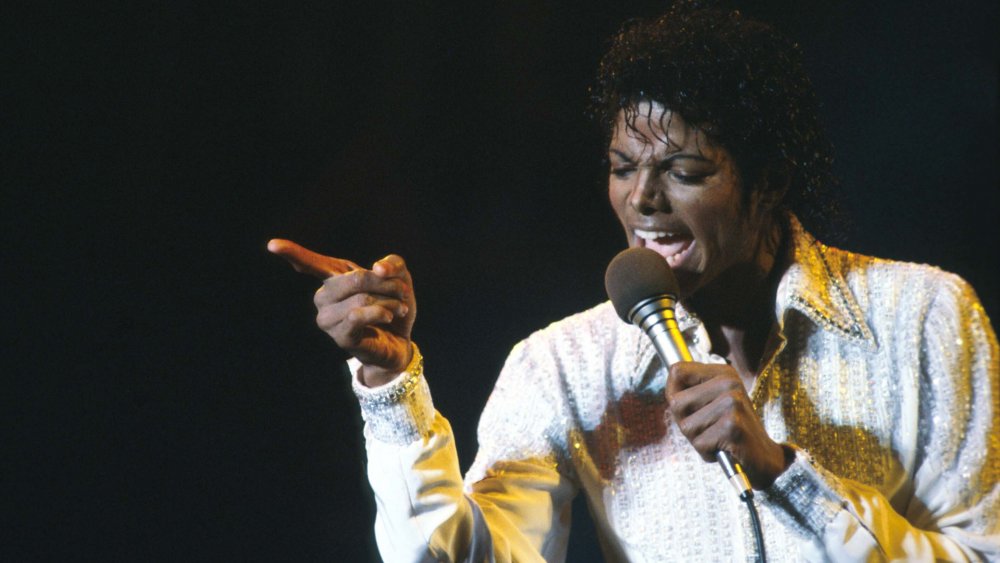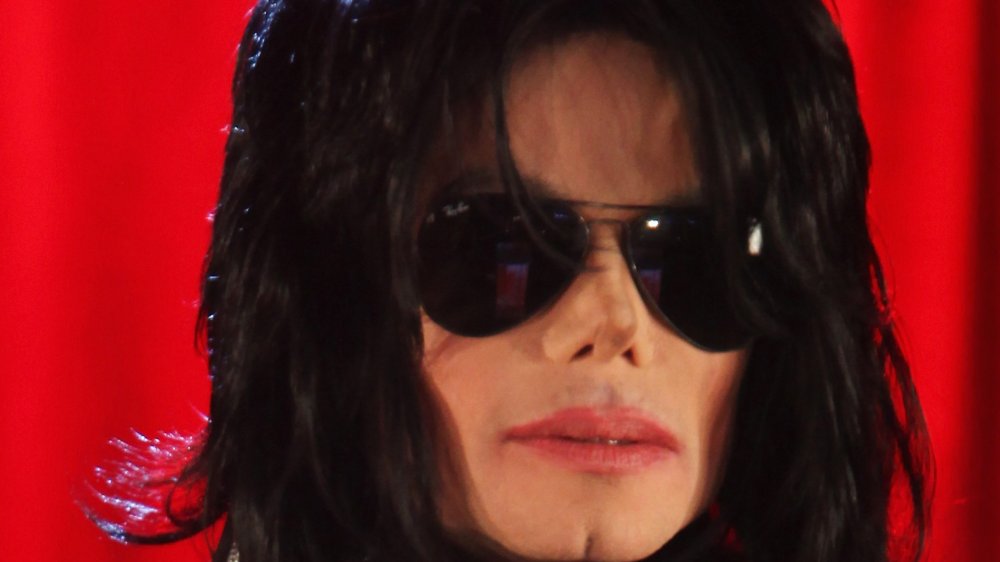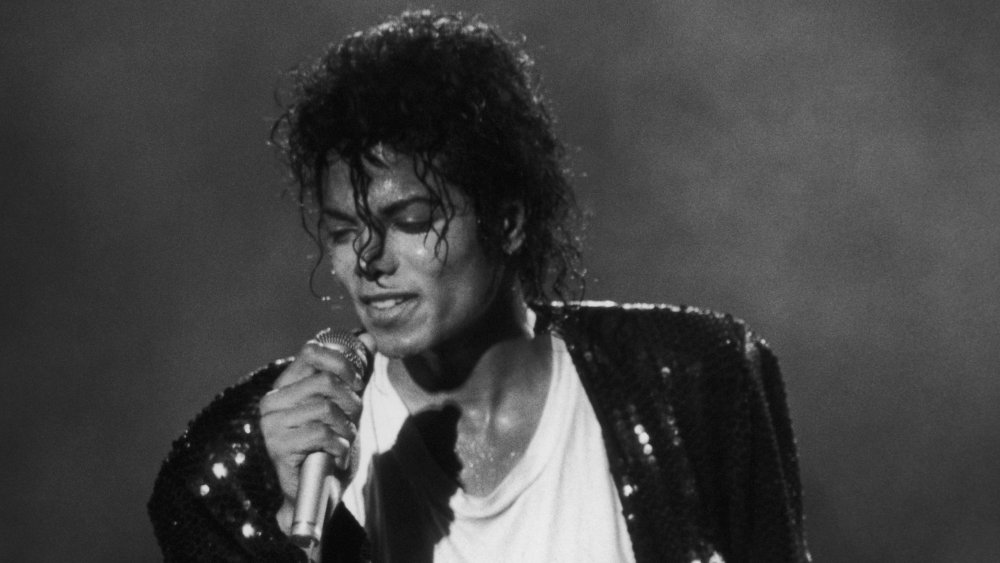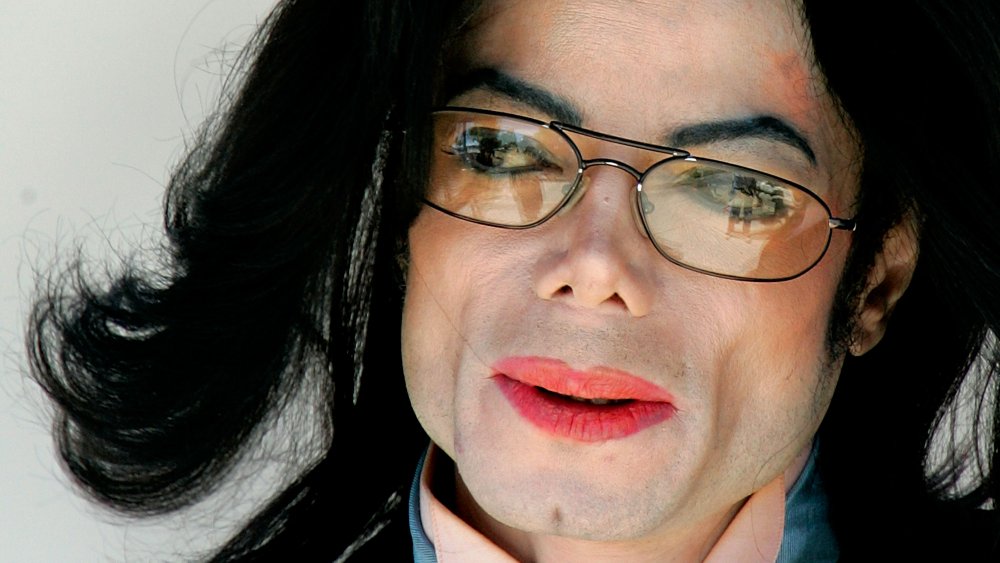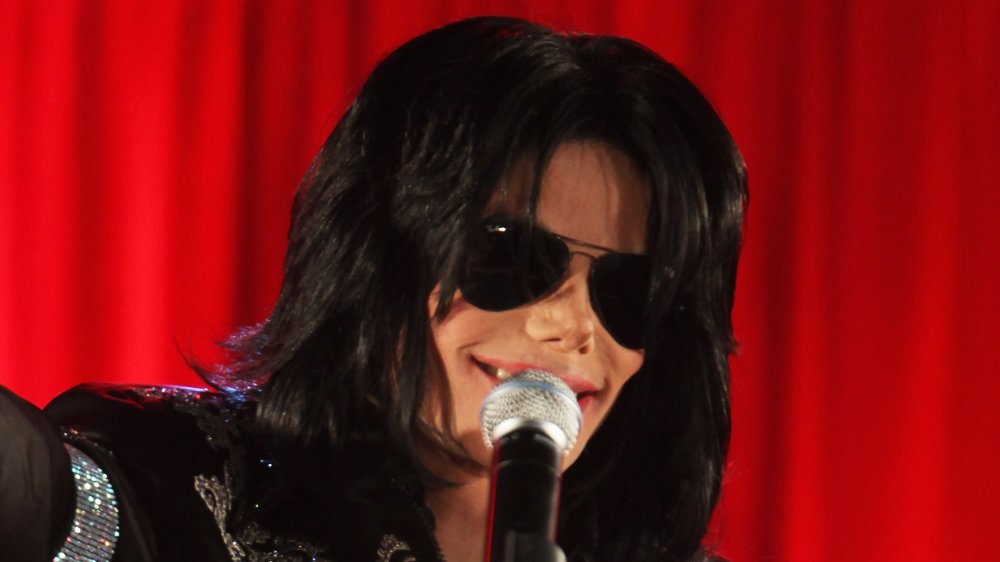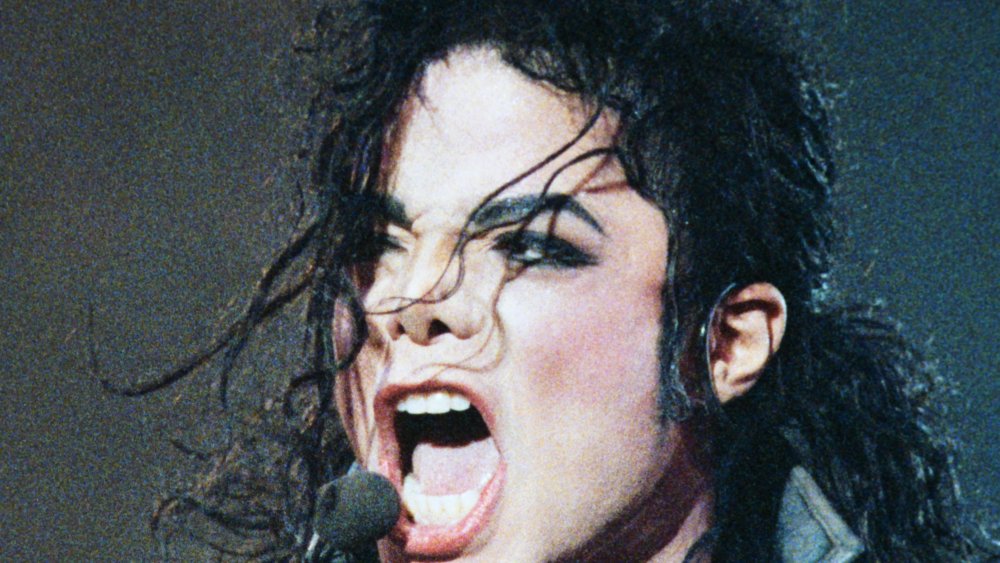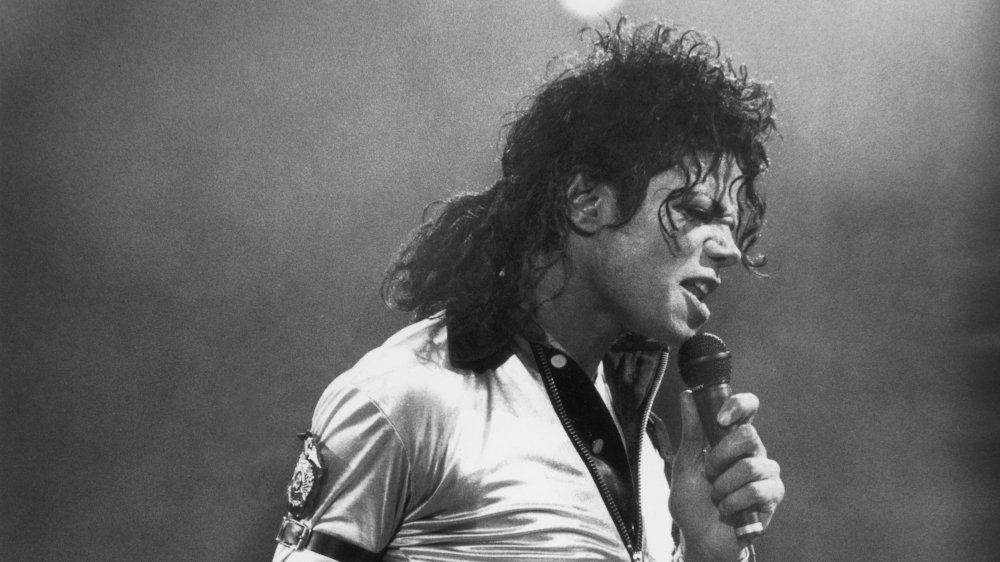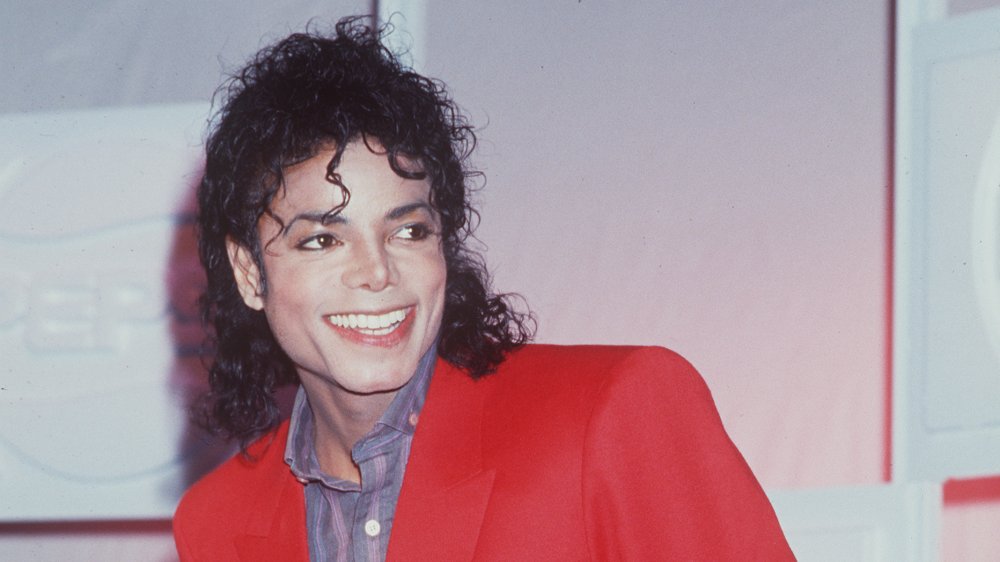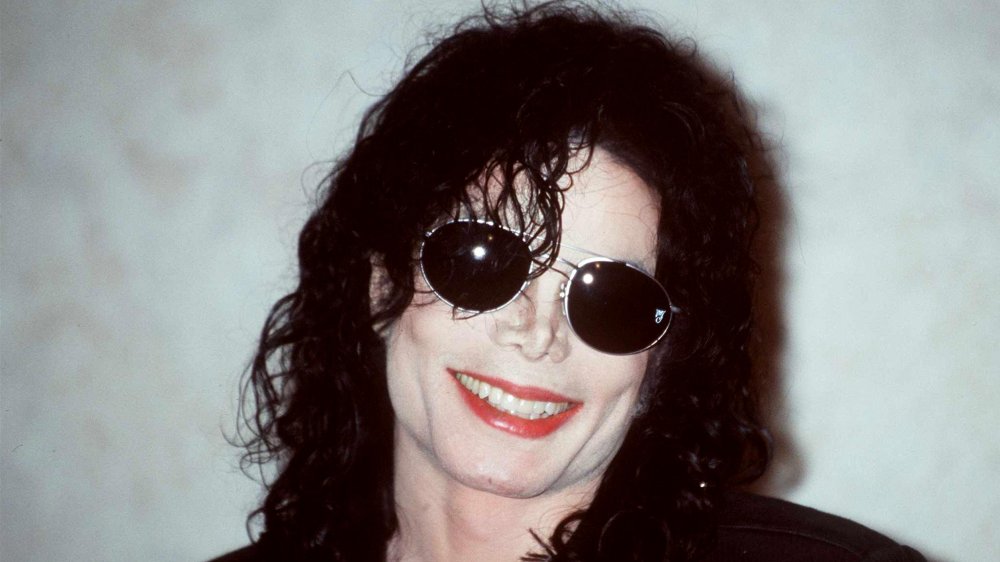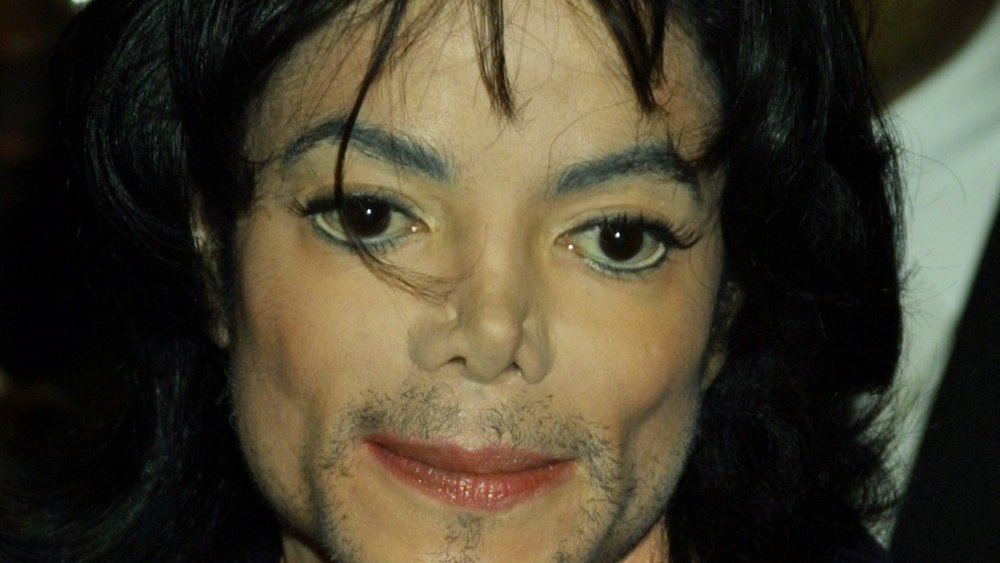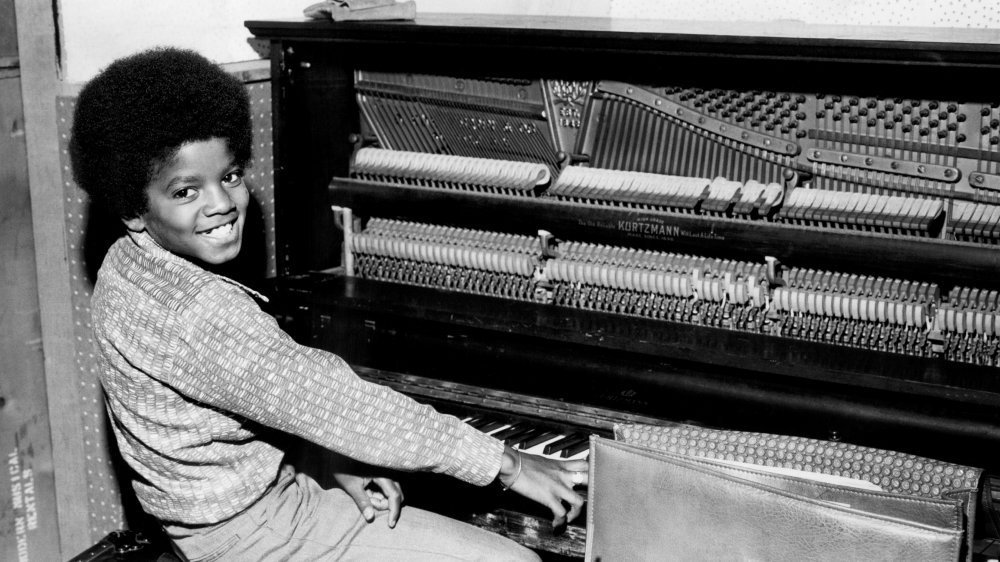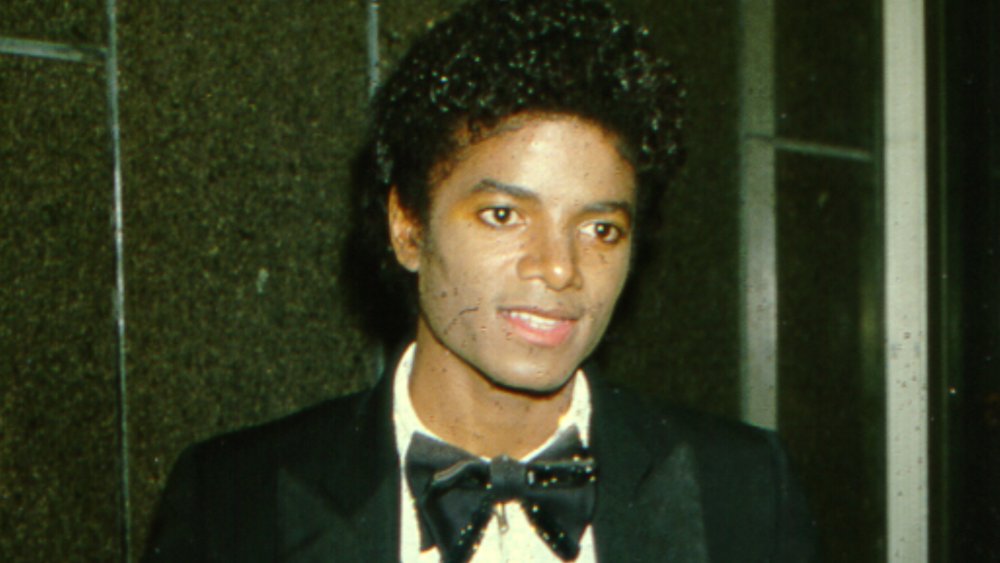What The Last 12 Months Of Michael Jackson's Life Were Like
The King of Pop, Michael Jackson was a legendary singer and dancer, known for delivering unforgettable hits like "Billy Jean," "Beat it," and "Thriller" and introducing the world to wonders such as moonwalking. The performer made history with his music and was honored with 13 Grammy Awards in his career. His album, Thriller, is considered to have broken several records and is one of the best-selling albums of all time.
Michael Jackson was talented and no stranger to controversy. He lived a life in the spotlight. Everything from his dancing and singing talent to his constantly changing appearance and his addiction to drugs were spoken about widely, and his music topped the charts for years, inspiring many listeners in different parts of the world. Jackson passed away at only 50 years old due to sudden cardiac arrest in 2009, leaving scores of fans shocked and grieving. Here are some lesser-known details from the controversial singer's final year of life.
Michael Jackson was supposed to host his comeback tour
Michael Jackson was planning to dazzle his fans with a series of concerts called "This Is It." The grand event was touted as a comeback for Jackson, who was slated to first perform in London and eventually pull off a total of 50 concerts, according to Rolling Stone.
Jackson's choreographer for This Is It, Kenny Ortega, spoke to Good Morning Britain about the performer's vision for the show. "It was really driven by Michael," he said (via Digital Spy). "From the very, very start, when Michael called me, he said to me, 'Kenny, this is it.' He said 'this is it' so many times that I went back to him and said, 'Why don't we just call the tour, 'This is It?' [...] He really wanted to do a tour so that his children could have an opportunity to see him in action, and to see him doing what he's loved all his life."
The show generated a lot of excitement among his fans, especially because the singer was coming back after a gap of several years. It is estimated that around 750,000 tickets were sold in five hours, and Jackson even had a Swarovski-made suit ready for his performances, a piece of clothing that was priced at approximately £1 million. Jackson's team was also planning to include DVDs of the tour and even a video game, among other things. Unfortunately, just days before his first show in London, he suffered cardiac arrest on June 25, 2009.
Michael Jackson was fighting health issues
Michael Jackson's health issues were prevalent in the last year of his life. Not only was he battling acute insomnia, but he often came across as disoriented and stressed to those around him. His lack of sleep was so bad that he had to rely on prescription drugs such as propofol to keep him going.
According to CNN, sleep experts weighed in after his death, stating that he'd gone 60 days without REM sleep, something that was incredibly damaging to his health. "The symptoms that Mr. Jackson was exhibiting were consistent with what someone might expect to see of someone suffering from total sleep deprivation over a chronic period," Dr. Charles Czeisler, a sleep researcher at Harvard Medical School, stated. "I believe that that constellation of symptoms was more probably than not induced by total sleep deprivation over a chronic period," he added. Dr. Czeisler reckoned that the deprivation of REM sleep caused by the propofol might have ended up killing Jackson on its own.
Michael Jackson's symptoms weren't just physical
In his final days, Michael Jackson fought an array of symptoms, including paranoia and fear. According to CNN, he even told his concert director, Kenny Ortega, that he could hear God. "God keeps talking to me," he said. It scared Ortega, who cried with associate producer Alif Sankey at a rehearsal. They were worried about how thin and weak Jackson was starting to look.
These facts emerged at a trial to decide whether the tour's promoter, AEG Live, was liable in Jackson's death. Sankey even made a phone call to Ortega after Jackson left their rehearsal and said she felt like the singer was dying. "I was screaming into the phone at that point," Sankey stated. "I said he needs to be put in the hospital now."
In order to cope, Jackson was relying heavily on alcohol. He was anxious and also obsessive at this time as he tried to make sense of what he was going through. Ortega emailed Randy Phillips from AEG and mentioned his concerns. "It is like there are two people there. One trying to hold on to what he was and still can be and not wanting us to quit him, the other in this weakened and troubled state," Ortega told Phillips, who was also worried. Phillips himself had reached out to AEG president Tim Leiweke in March after he found Jackson drunk and felt like the star was full of self-doubt.
Michael Jackson had a lot of debt
Not only was Michael Jackson fretting over getting This Is It right, but he also had a lot of debt that he needed to think about. After the 1993 court case in which he had to contest allegations of child abuse, his downward spiral began as he paid a massive sum to the child's family in a settlement. His publicist back then, Michael Levine, believed that the case was a turning point. "That kind of represents the beginning of the walk down a tragic path, financially, emotionally, spiritually, psychologically, legally," Levine told Billboard.
Jackson continued to deal with financial troubles and even tried to salvage the situation by striking a deal with Sony and, eventually, borrowing money from Bank of America. His court troubles didn't stop, either, and he was arrested after being accused of child abuse again in 2003. Jackson was acquitted of all charges two years later, but his financial situation was painfully clear. A forensic accountant stated that Jackson's troubles were huge and that he was spending at least $20 to $30 million more than what he managed to earn every year, according to Forbes.
When the singer passed away, his overall debt was a princely sum: approximately $500 million. It was believed that his comeback concerts would have solved his financial troubles and made life easier. If he'd been alive, he would have probably made somewhere around $500 million with This Is It.
Michael Jackson was happy just before his passing
The day before he died, Michael Jackson was pumped after what would be his final rehearsal, which lasted for six hours, and was in a great mood. "We all had goosebumps,” Randy Phillips stated to ABC News, describing the energy on display at the last rehearsal. "I had never seen such exultation in the cast and crew." Phillips even mentioned that Jackson put an arm around him later as they were leaving and told him, "Thank you for getting me here. I got it now, I know I can do this. I'll take it from here."
The session had gone rather well, and everyone present was speechless. According to Rolling Stone, Jackson was singing "Earth Song," and he closed it with, "What about death again? Do we give a damn?" The energy of the performance reminded everyone of Jackson from his greatest years and of his music legacy — his evolution into a pop star. After Jackson finished singing, he hugged his manager Frank DiLeo and declared, "This is our time again. It's time for us to take it back." He was optimistic.
Michael Jackson worked rather hard in his final year
Michael Jackson spent many hours, days, and weeks preparing for This Is It and was in great form. The singer knew his comeback tour would require hard work, and he left no stone unturned to prepare. He spent his last few months focusing hard on his concerts, and his close aides knew how excited he was. According to Rolling Stone, just weeks before his cardiac arrest, his longtime friend, author Deepak Chopra, asked him, "You're coming back for real?" Jackson was amused. "For real," he said and laughed.
He was determined to make his comeback count and for people to notice his work, even though he hadn't performed or released new music in years. Jackson was obsessed. He told Frank DiLeo, "We've got to put on the greatest show on Earth."
Jackson came close to making this happen. His hard work was paying off: Music producer Ken Ehrlich observed his last rehearsal and was amazed. "I turned to somebody and said, 'This is amazing!'" Ehrlich commented. "For so many years I have watched Chris Brown and Justin Timberlake and Usher and the Backstreet Boys and En Vogue all imitate Michael Jackson — and now here we were this many years later, and he was going to do it again. I got chills, literally. The hairs on the back of my neck were raised. Those are the moments you hope for."
Michael Jackson got in touch with his old mates
After getting AEG Live on board for his tour, Michael Jackson decided to reach out to many old friends and people he had worked with in the past in a bid to collaborate again. Some notable names include Frank DiLeo, Travis Payne, lawyer John Branca, and others. A lot of these professionals were people Michael had to part ways with in the past, and he was happy about reconnecting with them. "He understood that he would be working toward financial freedom, and he was very excited about that," DiLeo said. "It encouraged him — he knew he was working toward something."
Payne later spoke to ABC News about how Jackson was determined not to compromise on anything as far as the tour was concerned. "He wouldn't allow any of us to settle," he said. DiLeo, for his part, couldn't help but notice how Jackson was aching to sing and put on a show. "I saw a guy that wanted to perform. But he wanted to do it right," DiLeo said. "And he was strong enough."
Michael Jackson was focusing on staying in shape
Michael Jackson, despite his health issues, was unwilling to compromise and worked out every week. He hired a personal trainer, Lou Ferrigno, to ensure that he was on track before the tour was supposed to take off. A week after the performer passed away, Ferrigno said in an interview with ABC News that the singer was in good shape. "He might have been a little thin because he was under a lot of stress training for the tour," he said. "But when I put him through the routine and everything, I mean, it was just fine. I mean, very energetic."
Lots of speculations arose after Jackson's sudden cardiac arrest. According to Ferrigno, Jackson was energetic and seemed good to go on the outside. "He was dancing as good as anyone. And, you know, I'm an expert. And I was with Michael. If I didn't feel Michael could've pulled this off, I would've told him," Ferrigno emphasized. "I think he was going to give the greatest tour in his entire life."
The duo would train every week and had been acquainted with each other for 15 years. Ferrigno said that Jackson mostly focused on exercises that weren't intense, such as core conditioning. He did reveal that the pop star ate only once a day, and he took supplements based on Ferrigno's recommendations. "The most important thing was the attitude, the mind because he really wanted to be in his best shape," the trainer said.
Michael Jackson's close aides were worried about his addiction to prescription drugs
The fact that Michael Jackson was extremely dependent on prescription drugs was hard to ignore for those around him. According to ABC News, his family tried to intervene and help him several times. In 1993, the singer had stated publicly that he was checking into rehab to wean himself off drugs. "I remain out of the country. I have been undergoing treatment for dependency on pain medication. This medication was initially prescribed to soothe the excruciating pain that I was suffering after recent reconstructive surgery on my scalp," he said at that point.
His friend, Deepak Chopra, was transparent about Jackson's tough battle. "I became aware of it in 2005," Chopra told Rolling Stone. "I brought it up with him many times. His assistant would call frequently about it, saying he was being given medication by a lot of doctors. He would go to great lengths to get it — if one doctor didn't give it to him, he'd try another. It was an addiction that was created and perpetuated by doctors."
Michael Jackson's last night was tough
On his final night, Michael Jackson was restless. After finishing his rehearsal, he headed back home and tried to rest. According to the BBC, sleep evaded him, and he asked his physician, Dr. Conrad Murray, for help. Murray was Jackson's personal doctor, specifically brought in for the tour at $150,000 a month.
At this point, Murray had decided to stop giving Jackson propofol and tried to use other medications, including Valium, Ativan, and Versed, to help the singer get some sleep. However, his efforts were in vain — Jackson couldn't pass out all night, and he told his doctor the next morning that he needed rest before rehearsing. "I must be ready for the show in England," he told Murray. Finally, after listening to Jackson plead for some "milk," which is what he called propofol, the doctor agreed to administer some of it. Later, during investigations after Jackson's passing, Murray explained that he had everything he needed to keep track of Jackson and his heart rate during this time. He also stated that he left Jackson by himself only for two minutes to quickly visit the bathroom. When he got back, he noticed that Jackson had stopped breathing.
He tried to bring Michael Jackson back, but it didn't work. Several hours later, at 2:26 PM, the legend was declared dead at UCLA Medical Center. Murray was eventually convicted of involuntary manslaughter.
Oprah opened up about her conversations with Michael Jackson
After Michael Jackson's passing, Oprah Winfrey spoke about things he'd shared with her in an interview in 1993. She revealed how she felt when she was on her way to meet him: "We are coming in the gates of Neverland, and it's like a moment in The Wizard of Oz," she said. "It was literally like going to see the wizard. We couldn't believe it. I felt like a kid."
Jackson was unusually candid with Winfrey. He reflected on his difficult childhood and how he never had the chance to be like other kids. He was always working. During their interview, Michael spoke to Oprah about missing out on a normal childhood. "I remember going to the recording studio, and there was a park across the street, and I'd see all the children playing and I would cry. It would make me sad that I would have to go to work instead," he revealed.
Jackson also said that his father would often hit him and call him ugly. When Winfrey pressed further, Jackson explained that he didn't really know why his father was like that, but it was enough to scare him. The two also had a conversation about rumors around Jackson's changing skin color. Jackson told Winfrey he had vitiligo. "It is something I cannot help. When people make up stories that I don't want to be who I am, it hurts me," he explained.
Michael Jackson's sudden demise left the world shaken and divided
After Michael Jackson's death, many people, including celebrities, reacted and revealed how distraught they were. Per The Guardian, Madonna said, "I can't stop crying over the sad news." Jackson's ex, Lisa Marie Presley, said, "I am so very sad and confused with every emotion possible. I am heartbroken for his children, who I know were everything to him, and for his family. This is such a massive loss on so many levels, words fail me." Filmmaker Steven Spielberg called Jackson legendary. "Just as there will never be another Fred Astaire or Chuck Berry or Elvis Presley, there will never be anyone comparable to Michael Jackson," he said to Entertainment Weekly. "His talent, his wonderment and his mystery make him legend."
Others were divided about Jackson. Some fans expressed their grief, while others posted crude jokes on topics like plastic surgery. According to ABC News, tourists riding a bus to get a glimpse of Jackson's mansion from the outside ended up witnessing the final moments. The driver of the bus, Lisa Staub, revealed that she was asked to stop the bus by emergency personnel. An ambulance was on its way into Jackson's property. By the time Jackson was taken into the ambulance, there was a crowd outside the property comprised of tourists, journalists, and others. Jackson's brother, Jermaine, issued a moving statement after the incident and also revealed that despite several attempts at reviving the legend, doctors couldn't wake him up. "May Allah be with you, Michael, always," he said.
